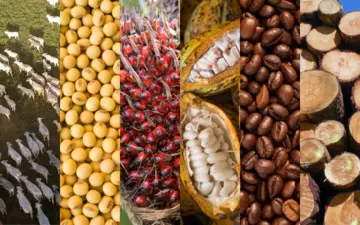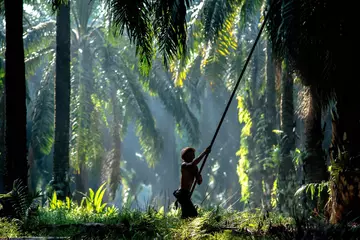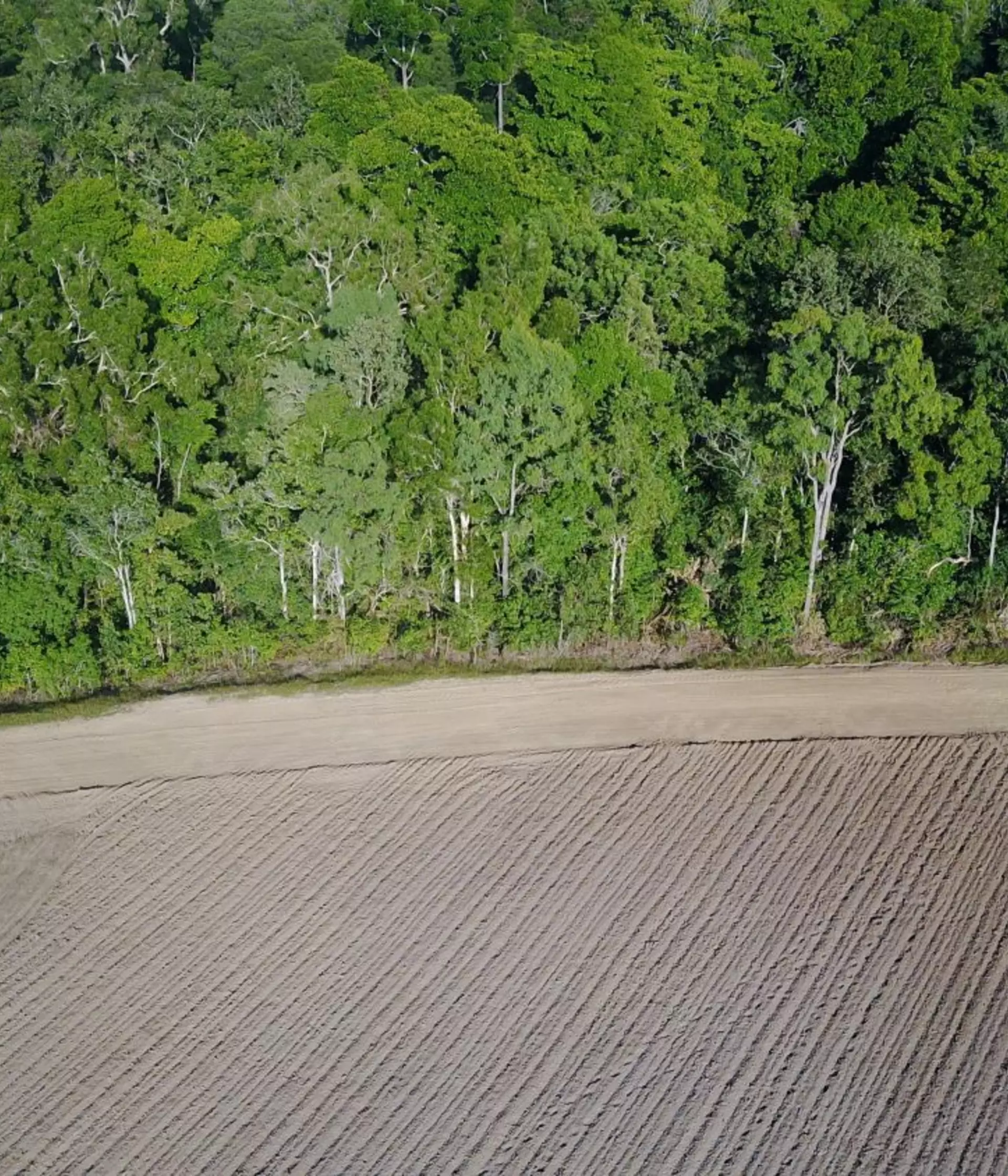
Oliver Cupit
Sustainable Business & Finance Programme Manager
As the EUDR comes into effect, ZSL is helping businesses with due diligence.
The midday sun beats down on us as we turn off the main road onto a dirt track leading into a patchwork of farmland and forest. Away from the highway, the undergrowth starts to creep in. We turn into a gateway and park outside a large wooden home alongside a river surrounded by a mosaic of trees and food crops. The heat and sound of insects flow in as I swing the truck door open. We head for the shade of the forest canopy where Somchan and Amara, the owners of this farmstead, are waiting to greet us.
The air here is cool, less stifling, the ground less firm. Somchan and Amara have farmed this 5-ha smallholding in central Thailand for 40 years. In a loop of the river, they have created a small piece of paradise. They proudly show us their rubber and teak plantations, but also pepper, cardamom, a fruit orchard, vegetable patch and cannabis - cultivation of which is now legal in Thailand - which they grow to help with their arthritis.
Ten years ago, they stopped spraying insecticides on their crops due to ill health. Somchan explains that alongside improved health, they have seen benefits for nature and the beauty of their farm by making this change. Termite mounds returned, and with them pangolins - the world’s most trafficked animal.
Their farm is also frequented by Asian Elephants from the neighbouring protected area, making their way to the river to drink and rather than deter them they are allowed to pass freely through the farm. This is incredibly important in an area of Thailand which is beset by human-elephant conflict. Amara is clear that they share this vibrant ecosystem with nature. As she says, "They were here first".
The problem: Unsustainable agriculture
Unfortunately, farming alongside nature is easier said than done on a global scale. There are too many incentives to damage natural ecosystems and the flora and fauna that reside within them. Land-use change is the number one driver of biodiversity loss globally, and deforestation is estimated to contribute 17% of all greenhouse gas emissions. A staggering 90% of forest loss is caused by conversion to agricultural land, for beef, soy, palm oil, coffee, cocoa, rubber and a handful of other crops.
Unlike Somchan and Amara, most farming practised today is not conducive to nature thriving alongside. Deforestation, over-use of chemicals, and poor planting practices lead to biodiversity loss, water pollution, ill health and farmers earning below living-income and in some cases living below the poverty line.
Much of this is due to a myriad of circumstances not directly attributable to small scale farmers, who are invariably simply trying to make a living. Somchan and Amara are amongst 6 million smallholder farmers that produce 85% of global rubber production. Approximately 40% of the world's palm oil is estimated to be produced by smallholders, whilst in cocoa and coffee the numbers are 90% and 80% respectively. Many of these farmers have never received basic training on good agricultural practices and thus yields are suboptimal. This creates a demand to open up more forest areas to increase production and income.
Across the other side of the world, under the leadership of Jair Bolsonaro, average annual deforestation in the Brazilian Amazon rose by 75.5% from the previous decade. This was largely due to clearance for cattle ranching and soy plantations and demonstrates the destructive power of regressive government policies.
Whilst in much of the Congo Basin's forestry sector, illegal logging is degrading intact forest landscapes and threatening the last strongholds for Gorillas, Chimps and forest elephants. In all of these 'forest-risk commodities' long and complex supply chains inhibit transparency around farm-level practices, lead to inadequate remuneration for producers and increase the risk of mixing sustainable produce with unknown and potentially illegal material.
The EU Deforestation Regulation (EUDR)
However, from 30 December 2024, importers of seven forest-risk commodities to the EU (beef, soy, palm oil, cocoa, coffee, rubber and timber) will be required by law to satisfy themselves that the products they are buying have not caused deforestation or breached legal requirements in the country of harvest. This law is both ground-breaking and worrying for business sectors.

EUDR compliance
Geolocation
Regulated importers and large traders of these goods will need to identify and declare each plot of land which was used to produce the crops or timber for every shipment entering the EU. This effectively means having full traceability from farm to import is required – a challenge in sectors such as palm oil, rubber and cocoa, where millions of smallholders produce the vast majority of supplies.
Products must be deforestation-free
The regulation also requires that once the field plot has been identified, satellite monitoring or other means will be used to determine that these production sites were not subject to deforestation after 2020 – i.e. the land was not converted from forest to agriculture after that date. This will require many who have never used remote sensing techniques to learn or contract specialist organisations to support them in monitoring.
Legality
And perhaps most difficult is that companies will be required to identify the relevant international, national and local laws in place which govern the production, harvest and trade of goods. This means identifying laws in every country sourced from covering land-use rights, environmental protection, forest-related rules, third parties’ rights, labour rights, human rights, free prior and informed consent (FPIC) and tax, anti-corruption and customs regulations. And then obtaining an indication that these laws have been complied with.
Challenges and opportunities for smallholders
This is a huge undertaking for the impacted sectors. However, actors in each of these sectors are already coming together to implement systems, overhaul traditional ways of working and upending how trade is done. Just a few weeks ago I visited smallholders, traders and factories in Southern Thailand to observe the measures that the sector is putting in place to comply with the EUDR.
A few years ago, many in the rubber sector said it was impossible to achieve traceability in such a complex system. Now it’s a legal requirement the trade has had to adapt – and quickly.
There is a danger that the speed of this transition will mean that some smallholders are cut out of supply chains because traders refuse to provide transparency on their sourcing. But there is also an opportunity to empower smallholders by simplifying supply chains and providing more direct access to buyers, or by using digital traceability solutions to track and trace sales – both could see value being transferred directly to smallholder producers rather than middlemen.
In Southern Thailand, I saw buyers and suppliers working together to implement practical measures to comply with the EUDR and ensure small farmers are supported to maintain access to the EU market.
How is ZSL helping businesses meet EUDR requirements?
At ZSL, we’ve worked for over 10 years on trade in forest-risk commodities, especially palm oil, timber and pulp and natural rubber supply chains. We developed our SPOTT platform, to measure change in corporate disclosure on key sustainability topics relevant to these sectors. We engage with buyers and financiers of these commodities in Europe and Asia to understand their data needs, as well as producers in Cameroon, Thailand, Indonesia and a range of other countries, to help them understand national legality requirements.
We’ve also helped guide leading sustainability schemes such as the Roundtable on Sustainable Palm Oil (RSPO), the Forest Stewardship Council (FSC) and the Global Platform for Sustainable Natural Rubber (GPSNR) on how to develop robust sustainability criteria. Our Responsible Sourcing Services support companies to align with:
- Sustainability regulations
- Voluntary corporate commitments
- Third-party sustainability standards
Regardless of your company's position in the supply chain – from forest or farm to processing, import, or retail. Our team of responsible sourcing specialists provides tailored and practical support on how your business can implement robust ESG management systems that protect ecosystems and wildlife.
Whether you’re looking to comply with regulations such as the EUDR or align with voluntary certification requirements such as FSC, we can help build your overarching sustainability strategy and link this to high-level targets such as the UN’s Sustainable Development Goals (SDGs).
Capacity sharing and training
When we start a relationship with a company, capacity sharing is the first crucial step, as we aim to leverage the joint knowledge and experience of both parties. It’s crucial for ZSL to get a good understanding of your business, how you work operationally and the opportunities and constraints you’re working within.
We can then design solutions to complex problems (like deforestation or poverty in supply chains) with you. Traditional training on, say, legal requirements for sourcing timber from Cameroon, is woven into this where we need to set a baseline understanding of requirements or concepts.
Set commitments and implementation strategies
Beyond this, we then help craft your high-level ambitions and targets, that can be packaged into a company Nature Policy or Sustainability Strategy. This sets your direction of travel and ensures the whole company's application and buy-in. However, a policy or strategy is useless without an implementation plan. We can help co-develop operational procedures and pathways for achieving the ambition set out in your commitments.
Manage ESG risks through due diligence
Controlling risk and shifting supply chains to increasingly sustainable sources should be a key goal for all companies. We maintain our own template Due Diligence System, which can be adapted and applied to support risk assessment in soft-commodity supply chains.
Our support here includes tailoring this system to fit your needs as well as targeted assessment of risk issues as an expert 3rd-party. We provide satellite monitoring capabilities to help you remotely sense deforestation and other environmental risks.
In select countries, we can deploy field staff to conduct on-site evaluations of environmental and social issues in value chains. And we don’t just stop at identifying issues. Our aim is to help address and resolve issues to the benefit of nature and people.
Communicate sustainability impact to stakeholders
Once all the hard work is done, communicating clearly and effectively about the positive impact that your sustainability investment has had is crucial. We support you to transparently and accurately communicate about your ESG practices.
Why work with ZSL?
Our innovative approach will help you find solutions to the most challenging sustainability issues, whether that be better use of satellite monitoring, forensic testing or artificial intelligence (AI). Our background as a world-leading conservation and scientific institute positions us to help you tackle the underlying drivers as well as proximate drivers of biodiversity and habitat loss.
We’re also aware that environmental and social considerations are intertwined and complex to address. With this in mind, ZSL has developed the FAIRER framework, which we draw upon to help you address social equity in your supply chains and sustainability strategy.
Our mission is to conserve and restore nature. That means that we reinvest all the profit we make into our conservation mission. So, by working with us, you’re not only supporting your organisation’s sustainability agenda but making an impact on sustainability and field conservation globally.

Supporting farmers like Somchan and Amara to produce crops in concert rather than in opposition to nature isn’t always simple at scale. However, it’s infinitely achievable with the right sustainability strategy, passionate people and the correct incentives. I know this because I’ve worked with world-leading companies down to small start-ups, who have embedded nature in their sourcing and have achieved it. Those who have are helping do their bit to turn the tide on biodiversity loss and tackling global deforestation.
Action like this allows us to not only imagine but to achieve a world where wildlife thrives.
Click here to download our Responsible Sourcing Services Factsheet or get in touch at sbf@zsl.org.
